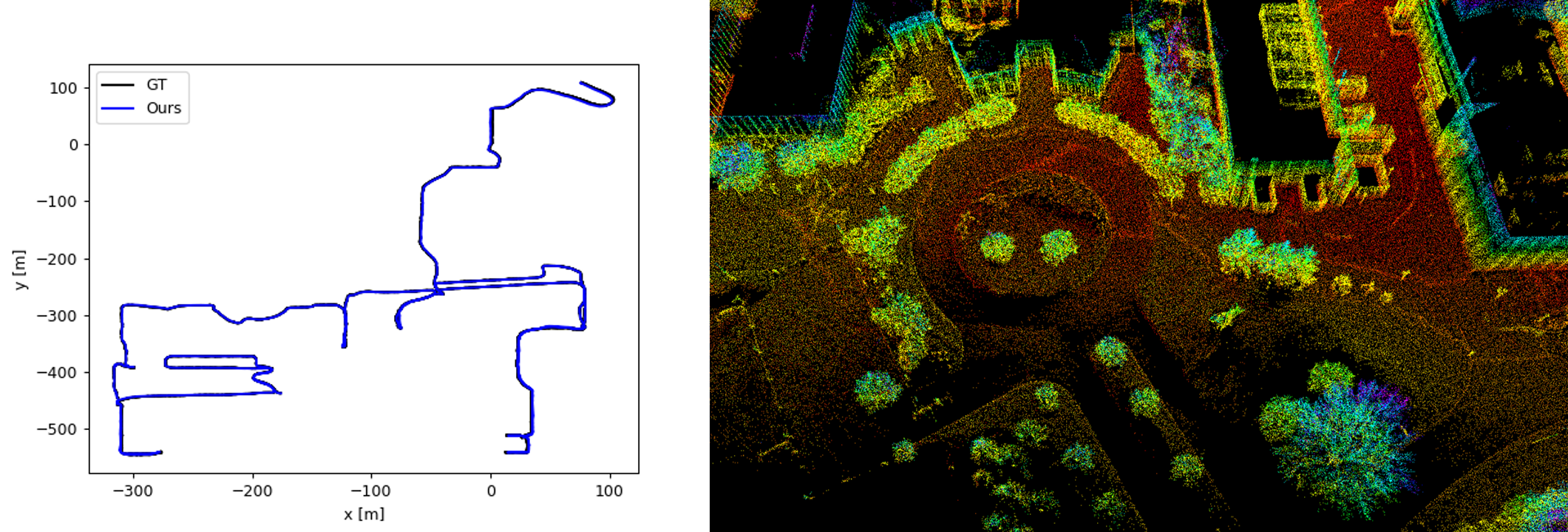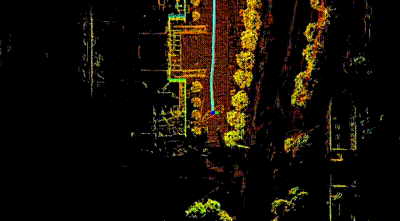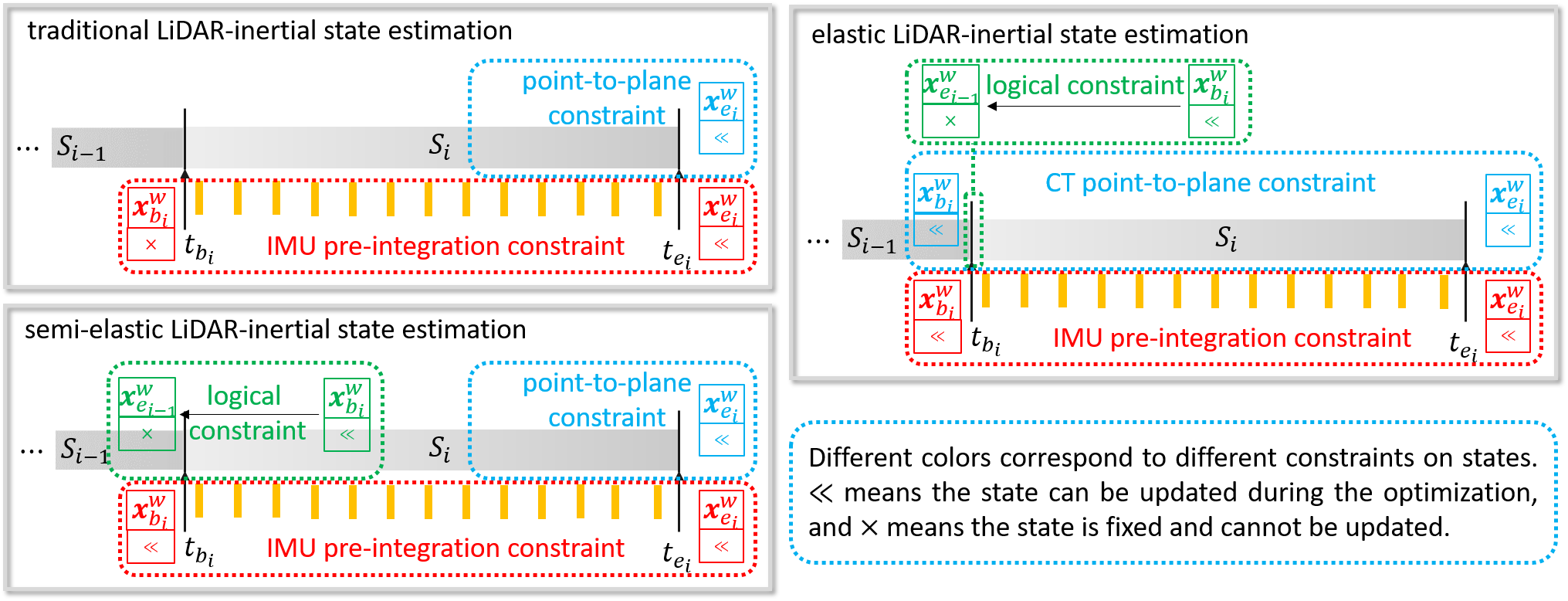Semi-Elastic-LIO (Semi-Elastic LiDAR-Inertial Odometry) is an accurate and robust optimization based LiDAR-inertial odometry (LIO). Compared with the previous work which treats the state at the beginning of current sweep as equal to the state at the end of previous sweep, the Semi-Elastic-LIO provides the state sufficient flexibility to be optimized to the correct value, thus preferably ensuring improved accuracy, consistency, and robustness of state estimation.
Semi-Elastic LiDAR-Inertial Odometry
Authors: Zikang Yuan, Fengtian Lang, Tianle Xu, Chengwei Zhao and Xin Yang
The comparison result between our estimated trajectoriy and ground truth on sequence nclt_2012-04-29 (left), the local point cloud map of nclt_2012-04-29 (center), and the x40 Real-Time Performance on sequence captured by a 16-line Robosense LiDAR and a IMU coming with StarNeto RTK (right). On our currently hardware platform (Intel Core i7-12700 and 32 GB RAM), and the Semi-Elastic-LIO need 60~70ms to handle a sweep under this environment.
Pipeline:
New Features: The proposed Semi-Elastic LiDAR-Inertial State Estimation method utilizes the point-to-plane constraint to ensure the state at the end of current sweep, and utilizes the logical constraint to ensure the state at the beginning of current sweep. The IMU pre-integration constraints both begin state and end state to make them satisfy kinematic constraints within elastic range. The comparison between our method with the traditional LiDAR-Inertial State Estimation and the Elastic LiDAR-Inertial State Estimation is illustrated by the figure as follow:
GCC >= 5.4.0
Cmake >= 3.0.2
Eigen3 >= 3.2.8
PCL == 1.7 for Ubuntu 16.04, and == 1.8 for Ubuntu 18.04
Ceres >= 1.14
| OS | GCC | Cmake | Eigen3 | PCL | Ceres |
|---|---|---|---|---|---|
| Ubuntu 16.04 | 5.4.0 | 3.16.0 | 3.2.8 | 1.7 | 1.14 |
| Ubuntu 18.04 | 7.5.0 | 3.11.2 | 3.3.4 | 1.8 | 1.14 |
mkdir -p ~/Semi-Elastic-LIO/src
cd Semi-Elastic-LIO/srcgit clone https://github.com/ZikangYuan/semi_elastic_lio.git
cd ..
catkin_makeNoted:
A. Except fot the external parameters between IMU and LiDAR, and the value of gravitational acceleration, the parameter configurations used in different datasets are exactly the same to demonstrate the stability and robustness of Semi-Elastic-LIO.
B. Please make sure the LiDAR point clouds have the "ring" channel information.
C. The warning message "Failed to find match for field 'time'." doesn't matter. It can be ignored.
D. Please create a folder named "output" before running. When Semi-Elastic-LIO is running, the estimated pose is recorded in real time in the pose.txt located in the output folder.
E. As the groundtruth acquisition of some datasets (UTBM and ULHK) are extremely complicated, in order to facilitate evaluation, we store the pose ground truth of the four datasets used by us as TUM format. Please down load from Google drive.
1. Run on NCLT
The time for finishing a sweep by the LiDAR of NCLT is not 100ms, but 130~140ms (around 7.5 Hz). Therefore, we need to package the data stream of the NCLT dataset as 7.5 Hz sweep packages. The nclt_to_rosbag.py in the "tools" folder can be used to package 7.5 Hz sweeps and linearly interpolated 100 Hz IMU data into a rosbag file:
python3 nclt_to_rosbag.py PATH_OF_NVLT_SEQUENCE_FOLDER PATH_OF_OUTPUT_BAGThen, please go to the workspace of Semi-Elastic-LIO and type:
cd Semi-Elastic-LIO
source devel/setup.bash
roslaunch semi_elastic_lio lio_nclt.launchThen open the terminal in the path of the bag file, and type:
rosbag play SEQUENCE_NAME.bag --clock -d 1.02. Run on UTBM
Before evaluating on UTBM dataset, a dependency needs to be installed. If your OS are Ubuntu 16.04, please type:
sudo apt-get install ros-kinetic-velodyne If your OS are Ubuntu 18.04, please type:
sudo apt-get install ros-melodic-velodyne Then open the terminal in the path of Semi-Elastic-LIO, and type:
source devel/setup.bash
roslaunch semi_elastic_lio lio_utbm.launchThen open the terminal in the path of the bag file, and type:
rosbag play SEQUENCE_NAME.bag --clock -d 1.03. Run on ULHK
For sequence HK-Data-2019-01-17 and HK-Data-2019-03-17, the imu data does not include the gravity acceleration component, and the topic of LiDAR point cloud data is /velodyne_points_0. For other sequences of ULHK used by us, the imu data includes the gravity acceleration component, and the topic of LiDAR point cloud data is /velodyne_points. Therefore, we provide two launch files for the ULHK dataset.
If you test Semi-Elastic-LIO on HK-Data-2019-01-17 or HK-Data-2019-03-17, please type:
source devel/setup.bash
roslaunch semi_elastic_lio lio_ulhk1.launchIf you test Semi-Elastic-LIO on HK-Data-2019-03-16-1, HK-Data-2019-04-26-1 or HK-Data-2019-04-26-2, please type:
sourcr devel/setup.bash
roslaunch semi_elastic_lio lio_ulhk2.launchThen open the terminal in the path of the bag file, and type:
rosbag play SEQUENCE_NAME.bag --clock -d 1.04. Run on KAIST
For point clouds, we utilize the data from both two 3D LiDARs of KAIST. Users can package the rosbag according to the tool kaist2bag. The partial test sequences of KAIST used by us can also be downloaded from Google drive.
Chinese users can download the test sequences of KAIST form baidu yun, while the password is s4bw.
Please go to the workspace of Semi-Elastic-LIO and type:
source devel/setup.bash
roslaunch semi_elastic_lio lio_kaist.launchThen open the terminal in the path of the bag file, and type:
rosbag play SEQUENCE_NAME.bag --clock -d 1.0If you use our work in your research project, please consider citing:
@article{yuan2023semi,
title={Semi-Elastic LiDAR-Inertial Odometry},
author={Yuan, Zikang and Lang, Fengtian, Xu, Tianle, Zhao, Chengwei and Yang, Xin},
journal={arXiv preprint arXiv:2307.07792},
year={2023}
}
Thanks for CT-ICP, Fast-LIO, VINs-Mono, Open-VINs and CT-LIO.



